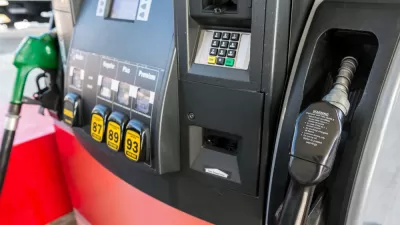The COP21 talks in Paris won't take on transportation directly, "the world’s fastest-growing energy-based contributor to greenhouse gases," writes David Jolly for The New York Times. Electric vehicles and fuel efficiency face formidable challenges.
Electric vehicle boosters have grand goals when it comes to the spread of electric or zero emission vehicles (ZEVs), such as the International ZEV Alliance Announcement on December 3 "to make all passenger vehicle sales in our jurisdictions ZEVs as fast as possible, and no later than 2050." While it will be interesting to see how successful they are in their 11 states, provinces, and countries, it will have little effect on a worldwide scale.
"The number of automobiles on the world’s roads is on pace to double [PDF]— to more than two billion — by the year 2030," writes David Jolly. "And more likely than not, most of those cars will be burning carbon-emitting gasoline or diesel."
But optimists argue that even in the case of cars with internal-combustion engines, carbon dioxide emissions can be cut significantly by measures like increasing fuel economy and introducing smart-driving technologies to make cars move about with greater efficiency.
However, there are daunting challenges to increasing fuel efficiency.
Reducing tailpipe carbon dioxide emissions “is absolutely possible,” said Daniel F. Becker, director of the Safe Climate Campaign, an environmental group based in Washington.
“But the automakers are attacking these standards as we speak, both in Congress and through a review of the program they demanded from the Obama administration,” Mr. Becker said. “Similar attacks are underway in the E.U.”
Neither Jolly nor Becker discuss another formidable challenge in reducing what Lewis M. Fulton, a researcher at the Institute of Transportation Studies at the University of California, Davis, calls “'carbon intensity' — the amount of carbon dioxide produced for each mile traveled," notes Jolly.
At the same time delegates were working in Paris on an international agreement to reduce carbon emissions, another international body met in a different European capital, Vienna, on December 4 and came to an agreement sure to increase carbon emissions from the transportation sector.
"The Organization of the Petroleum Exporting Countries (OPEC) said on Friday that it would keep producing oil at current levels, which are estimated to exceed 31 million barrels a day," write Stanley Reed and Sara Hamdan for The New York Times.
As a result, crude oil prices "plunged 5 percent on Monday to fall to their lowest levels since the 2009 global recession," writes Clifford Krauss of The Times. The "global oil glut that has caused prices to plunge by more than 50 percent since early last year" is sure to continue, note Reed and Hamdan.
As the research of Michael Sivak of the University of Michigan Transportation Research Institute has illustrated, cheap gas defeats fuel efficiency goals as motorists are attracted to more gas-gulping pickups and SUVs. At the same time, it is a major reason for the latest increases in vehicle miles traveled that have shattered the so-called 'peak driving' age that the U.S. had thought to be experiencing.
Hat tips to Jennifer Scholtes and Martine Powers of POLITICO Morning Transportation.
FULL STORY: Despite Push for Cleaner Cars, Sheer Numbers Could Work Against Climate Benefits

Alabama: Trump Terminates Settlements for Black Communities Harmed By Raw Sewage
Trump deemed the landmark civil rights agreement “illegal DEI and environmental justice policy.”

Study: Maui’s Plan to Convert Vacation Rentals to Long-Term Housing Could Cause Nearly $1 Billion Economic Loss
The plan would reduce visitor accommodation by 25% resulting in 1,900 jobs lost.

Planetizen Federal Action Tracker
A weekly monitor of how Trump’s orders and actions are impacting planners and planning in America.

Waymo Gets Permission to Map SF’s Market Street
If allowed to operate on the traffic-restricted street, Waymo’s autonomous taxis would have a leg up over ride-hailing competitors — and counter the city’s efforts to grow bike and pedestrian on the thoroughfare.

Parklet Symposium Highlights the Success of Shared Spaces
Parklets got a boost during the Covid-19 pandemic, when the concept was translated to outdoor dining programs that offered restaurants a lifeline during the shutdown.

Federal Homelessness Agency Places Entire Staff on Leave
The U.S. Interagency Council on Homelessness is the only federal agency dedicated to preventing and ending homelessness.
Urban Design for Planners 1: Software Tools
This six-course series explores essential urban design concepts using open source software and equips planners with the tools they need to participate fully in the urban design process.
Planning for Universal Design
Learn the tools for implementing Universal Design in planning regulations.
Caltrans
Smith Gee Studio
Institute for Housing and Urban Development Studies (IHS)
City of Grandview
Harvard GSD Executive Education
Toledo-Lucas County Plan Commissions
Salt Lake City
NYU Wagner Graduate School of Public Service



























